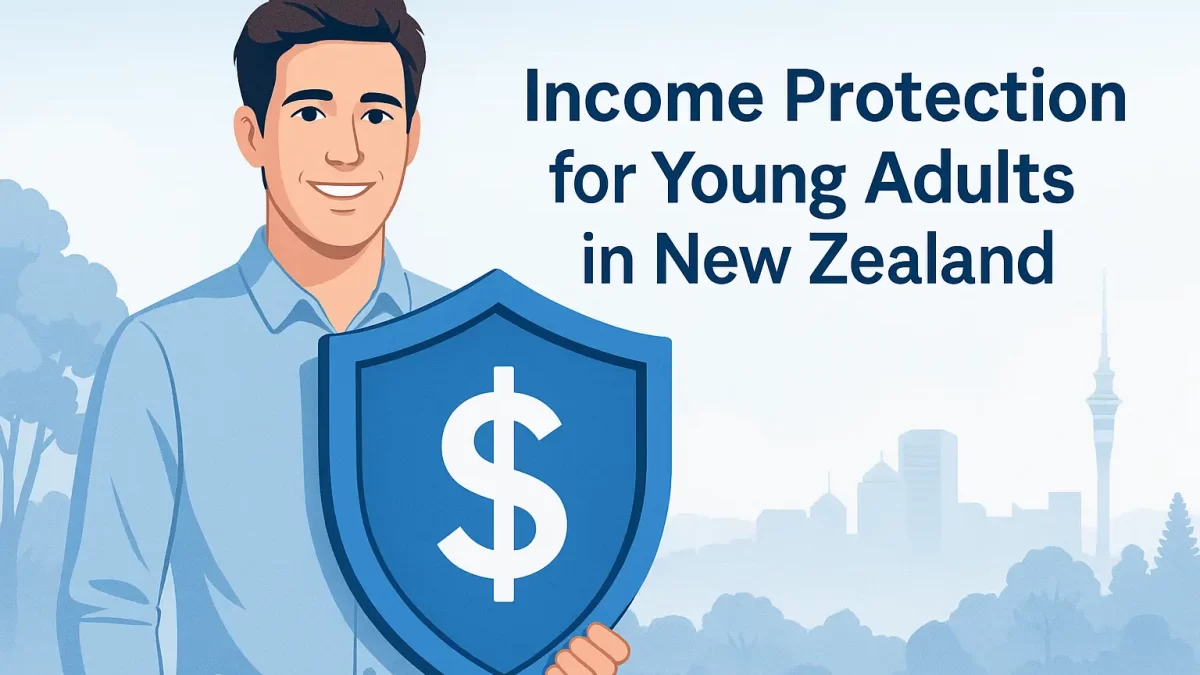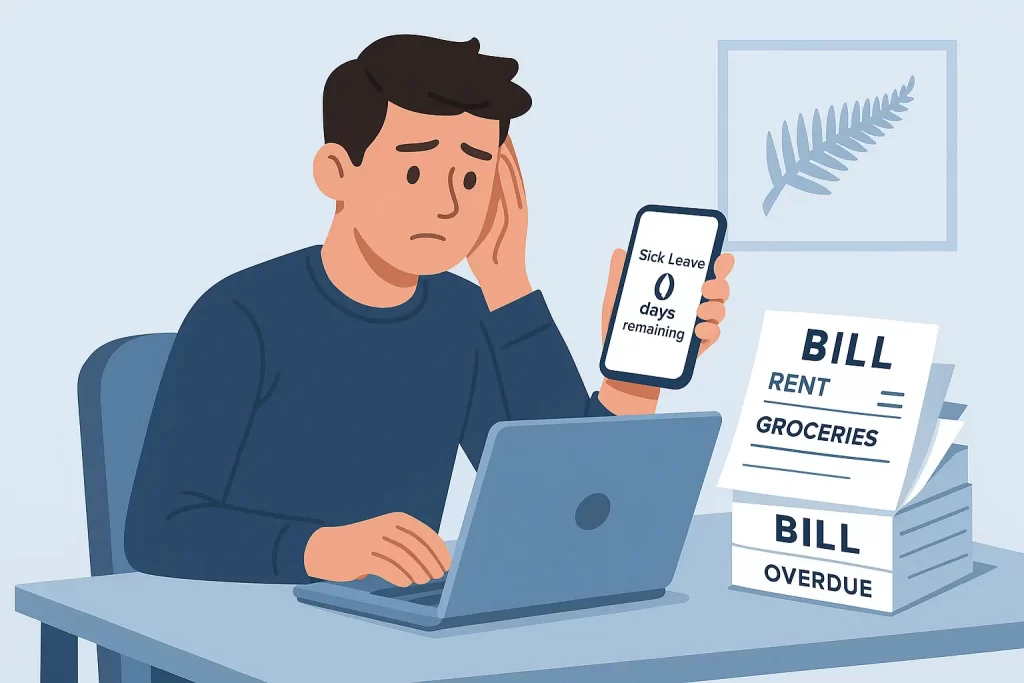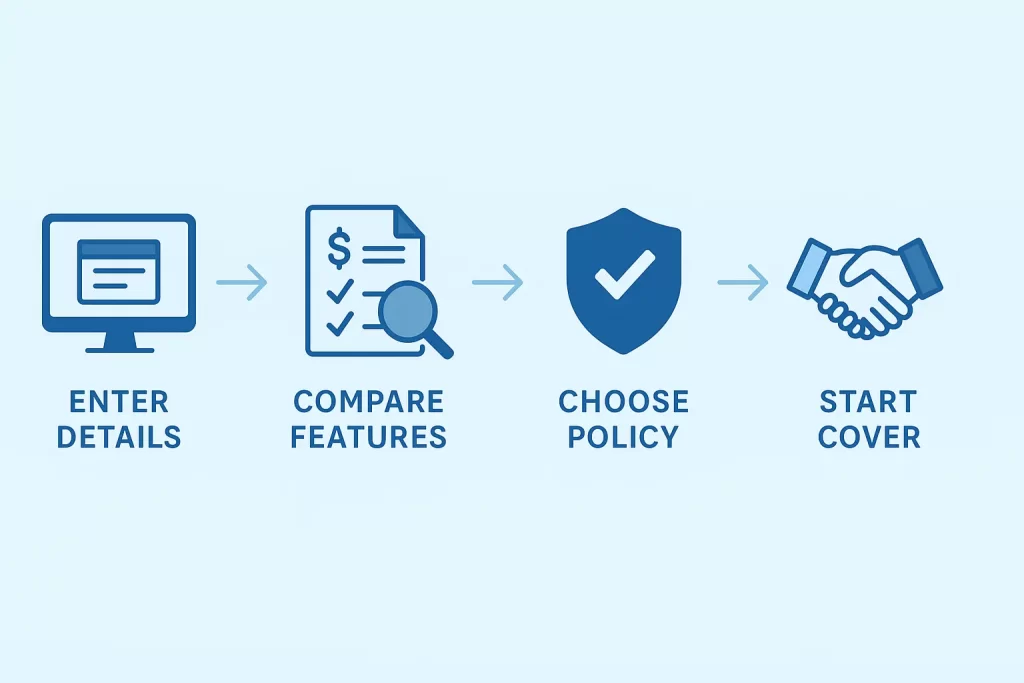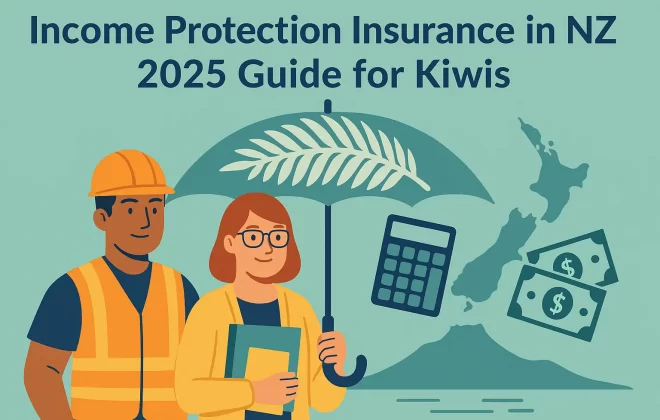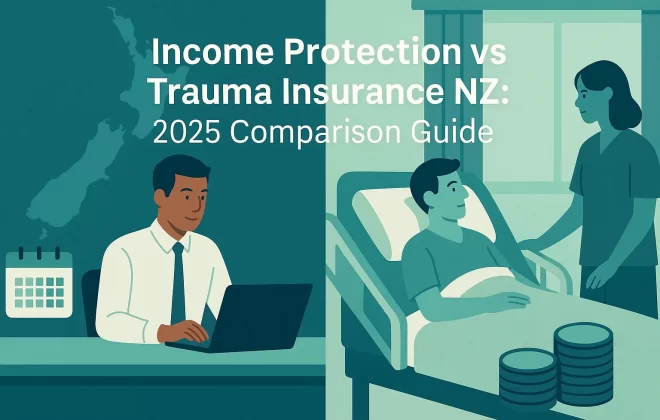Income Protection for Young Adults in New Zealand
Income Protection for Young Adults: What It Covers
When it comes to Income Protection for Young Adults, your ability to earn a wage is your single most important asset. After all, over a 40-year career, the average Kiwi could earn around $2 million. But what happens if illness or injury suddenly stops your pay? In New Zealand, approximately one in seven households will face a serious illness or injury, resulting in the breadwinner being out of work for three months or more. That can be a nightmare if your bills keep coming—rent, groceries, loans—even after your paid sick days (just 10 per year after 6 months’ service) and ACC entitlements run out.
Income Protection Insurance is a private policy designed to keep you afloat in this exact situation. It replaces part of your income (commonly up to 75%) if you can’t work due to illness or injury. Unlike ACC, which only covers accidents up to about 80% of your pay, income protection kicks in for almost any medical issue – flu, surgery, mental health, chronic illness and more. With Income protection insurance, you pick your waiting period (how long before benefits start) and your benefit period (how long payments last), so you have a safety net tailored to your life.
Below, we’ll explain why this cover is especially smart for 18–35-year-olds in NZ. We’ll break down the gaps ACC leaves (remember – no ACC for illness), what features to look for in a policy, and how to shop around for the best deal. By the end, you’ll see how income protection can keep your rent paid and savings intact when the unexpected happens – and how our free comparison tool makes getting quotes a breeze.
Why Your Pay Packet Needs Protection
Your income is more than just money – it pays the bills that keep your life running. If you’re flatting, paying student loans or just building a life, even a few months without pay can be devastating. Consider this: in New Zealand, 20% of households could only cover their expenses for one week if their primary earner stopped receiving pay, and 55% would run out of money within a month. Those are scary odds to face alone. For Income Protection for Young Adults, replacing up to 75 per cent of your salary can bridge the gap left by sick leave and ACC.
ACC and sick leave help a bit, but they have limits: you only get 10 paid sick days a year after six months on the job(MBIE sick leave guide), and ACC only pays for accidents (at about 80% of your income, and only up to a cap). If you catch a serious flu, hurt your back playing sports, or have mental health issues, ACC provides nothing. After your sick leave or annual leave is used up, you’d have to dig into savings or rely on family.
Income Protection Insurance fills that gap. It’s like a backup paycheck. If illness or non-accident injury sidelines you, Income protection insurance can replace up to 75% of your salary. This helps you pay rent, mortgage, utilities, groceries, and loan repayments without raiding your emergency fund. The money from a claim is yours to use however you need. You can focus on getting well instead of stressing over bills.
For example, say you get a serious illness and can’t work for 6 months. ACC won’t help (since there was no accident), and your 10 days’ sick leave and any annual leave will probably run out long before then. Income protection insurance would pay you a steady portion of your wage during that time. Your landlord still gets paid, and you don’t have to take on debt to survive.
In short, think of Income protection insurance as a safety net for your career. It means you can safely weather illness and injury without falling into financial hardship.
Who Can Apply?
If you’re researching Income Protection for Young Adults in New Zealand, you’ll find most insurers welcome 16–60-year-olds who work 15+ hours a week. Here’s what insurers typically look for:
- Age & Residency: Generally between 16 and 60 years old (some insurers extend up to 65 for lower-risk roles). You must be a New Zealand citizen, resident or on a valid work visa.
- Employment Status: Full-time, part-time, casual or self-employed—if you work 15 hours or more per week, you usually qualify.
- Occupation: Most white-collar and low-risk roles are fine. Very high-risk jobs (e.g. deep-sea diving, firefighting, mining) may be excluded or load your premium higher.
- Health Declaration: You’ll answer health questions. Pre-existing conditions (like asthma, depression or back problems) may lead to exclusions or extra premiums.
- Recent Work: You need to be actively working or have recently worked to apply.
For full details on eligibility, please refer to our comprehensive guide or contact an adviser. Official ACC information on accident cover can be found at ACC.co.nz.
How ACC (and Sick Leave) Work
It helps to understand what ACC and employer sick pay do cover, so you know where the holes are:
- ACC (Accident Compensation Corporation) – This is NZ’s no-fault accident scheme. If you have an accident that injures you, ACC pays up to 80% of your pre-injury earnings as weekly compensation (after you use your first week of employer sick pay). This benefit lasts until you return to work, but ACC has a cap on the weekly amount (approximately NZ$2,066 per week). Crucially, ACC does NOT cover illness – only physical injuries from accidents. So if you’re off work with depression, cancer, severe flu or any sickness, ACC won’t pay your wages at all.
- Employer sick leave – Most New Zealand employers provide at least 10 days of paid sick leave per year (after 6 months of service). Use that up, and you’re on your own. There’s no legal requirement for more, and unpaid time off could mean no income at all.
- Other benefits – Government supports (like sickness or jobseeker benefits) usually pay only a few hundred dollars a week and have strict rules. They are meant as a last resort, not a complete replacement for your salary.
Bottom line: ACC plus sick leave can only cover so much. Many young people assume “ACC will sort it if something bad happens,” but in reality, ACC only helps with accidents. It won’t cover 80% of absences that are due to illness, nor guarantee your full income. That’s where private income protection steps in.
Why Young Adults Should Consider Income Protection
Even if you’re fit and healthy now, life can change on a dime. Illnesses, injuries, or mental health issues don’t only happen to the older generation. In fact, 20% of New Zealand workers log 50+ hour weeks, which raises stress and burnout risk, and many injuries aren’t strictly accidents (think sports injuries or occupational strain). Income Protection for Young Adults isn’t just about accidents—modern policies cover illnesses, sports injuries and mental health. Consider these reasons young Kiwis (18–35) should look into income protection:
- Bridge the sick-leave gap. After six months’ service, you only get 10 paid sick days a year. That can disappear quickly if, say, you break your leg and need surgery or if you face a prolonged illness. Once those days are gone, you have no guaranteed pay. Income protection can cover up to 75% of your salary during longer absences, so you don’t have to raid savings or fall behind on rent. Remember that ACC would only pay accident-related injuries (even then up to 80% of earnings), but Income protection insurance covers both illnesses and injuries, filling in ACC’s gaps.
- Cover your lifestyle and loans. Young adults often juggle rents, car payments, student loans or even a first mortgage. If you suddenly can’t work, those still need paying. Income protection keeps covering these costs. It’s especially useful if you’re self-employed, a contractor, or on a short-term contract, where there’s no employer sick pay at all – Income protection insurance replaces lost income so you can keep your business afloat or rent paid.
- Lock in cheaper premiums now. Premiums for income protection are based on your age, health and occupation. Being younger and healthier usually means much lower rates. Buying a policy in your 20s or early 30s locks in that rate for life. If you wait until your 40s or 50s, not only will premiums be higher, but any health issues you develop (e.g. asthma, depression, a back condition) could lead insurers to charge more or exclude coverage for those conditions. Securing cover early saves money and ensures you can claim in the future if needed.
- Peace of mind (and support). Young careers can be hectic – long hours, shifting roles, and building up experience. High stress and burnout are real risks, particularly in the early stages. Income protection not only pays you money if you need time off for surgery or stress recovery, but many policies also include rehabilitation and return-to-work support. This means your insurer might help fund counselling, physio, or job retraining to get you back on your feet faster. Knowing you have that backup lets you focus on health when it matters, rather than worrying constantly about finances.
- Adaptable coverage. As you progress, you can adjust your cover. Maybe you start with 50% of your income for 2 2-year cover, then later increase it when you have a mortgage. Unlike fixed employer schemes, Income protection insurance is flexible to fit your life stage.
In short, Income protection insurance isn’t just for those with kids or big mortgages – it’s for any Kiwi who has monthly obligations and doesn’t want to fall behind if they get sick. It bridges the gap left by ACC and limited sick pay, and it gives younger people an affordable way to secure their future income.
Key Policy Features (and What to Compare)
Not all income protection policies are the same. Here are the main features you should look at when comparing plans:
- Waiting Period. This is the minimum amount of time you must be off work before the insurer pays you. Standard options are available for 2 weeks, 4 weeks, 8 weeks, or up to 26 weeks. A shorter waiting period (e.g. 2–4 weeks) means you start getting paid sooner, which is great if you don’t have big savings. But it also makes your premium higher. A longer waiting period (e.g. 8+ weeks) keeps premiums lower, but you must have enough rainy-day savings to cover that initial gap. Think about your cash reserves when picking this.
- Benefit Period. This is how long the policy will pay once a claim starts. You might choose:
- Short-term (e.g. 2 or 5 years) – cheaper, and fine if you have enough savings to cover anything longer (or if you just want cover for specific treatments).
- Long-term (to age 65/70) – more expensive, but it covers you until you retire, which is great if you could be off work for years.
A long-term coverage plan provides the ultimate safety net, although it costs more. Balance this with how long you think you’d need support
- Cover Amount (% of Salary). Policies typically cover up to 75% of your gross (pre-tax) income. But you can usually choose a lower percentage (like 50% or 60%) to reduce premiums. Consider your essential expenses: how much you really need to pay rent/mortgage and bills. If 75% feels like overkill (or too expensive), maybe 60% is enough. Just remember, 100% coverage is not available (and would be fraud) – insurers cap at 75% to motivate you to return to work when able.
- Policy Basis: Agreed Value vs Indemnity.
- Agreed Value means you and the insurer agree on your income when you take out the policy. If you claim later, you get that fixed amount, regardless of any pay cuts or changes. It’s predictable.
- Indemnity means they look at your actual income when you claim (tax records, payslips). If your earnings dropped (say you moved to part-time), the payout could be less.
For younger people, agreed-value is often safer – you lock in your current income. Just ensure it’s set accurately at the start.
- ACC Offset. Most insurers will deduct (offset) any ACC weekly compensation from your Income protection insurance benefit, so you don’t double-dip. For example, if ACC pays you $1,200/wk and your policy entitlement is $1,125/wk (75% of $1,500), the insurer only pays the $75 difference. It’s good because you never get more than your usual income. Check if the policy clearly explains this offset. Some plans also offer partial disability cover – this pays a portion of your benefit if you can still work a bit (for example 50% pay for half-time work). If you want that flexibility, look for it.
- Extra Features (Value-Adds). Some policies include helpful add-ons. These might be:
- Rehabilitation and Return-to-Work Support: Access to physio or counselling and help easing back into work.
- Indexation: Some insurers will automatically boost your cover each year to keep pace with inflation or wage increases (so your benefit won’t shrink over time).
- Premium Waivers: Options where your premium is paused if you go on maternity leave or become seriously ill (so you can’t cancel the policy from financial hardship).
Check if any of these are included or available as options. They can make a big difference in the long term.
When comparing policies, consider all these features side by side with the price. The cheapest premium isn’t always the best deal if it means giving up a short waiting period or excluding mental health, for example. By choosing Income Protection for Young Adults now, you lock in lower premiums and avoid future health exclusions.
Protect Your Future Self
Taking out income protection insurance now is a proactive step to safeguard your financial future. It’s not just about covering bills—it’s about giving yourself options and peace of mind:
- Peace of Mind: Knowing your income is protected lets you focus on recovery, not on unpaid rent or mounting debt. As Sorted (the government-backed money guide) says, “having money at the ready just in case is what makes us financially resilient.” Check out Sorted’s budgeting guide for free tools and tips.
- Build an Emergency Fund: While insurance fills big gaps, start with savings to cover the waiting period. Sorted recommends aiming for 3–6 months of expenses; even a small buffer (NZ$1,000) is a great start.
- KiwiSaver: Don’t forget long-term saving. KiwiSaver contributions allow you to “pay yourself first” and attract employer and government contributions. Learn more at kiwisaver.govt.nz.
- Lock in Lower Premiums: Younger, healthier applicants pay less. Policies can start from around NZ$20–30 per month for basic cover—pay a bit now to save thousands later.
- Stay Flexible: As your life changes, so can your cover. Increase your sum insured if you take on a mortgage or add riders such as rehabilitation support or premium waivers for maternity leave.
By combining income protection insurance with smart saving and budgeting, you’ll truly protect your future self against whatever life throws at you.
Comparing Insurance and Getting Cover
Once you know what features you want, it’s time to shop around. Here’s how to get the best cover for your situation:
- Use a Comparison Tool. Instead of visiting each insurer individually, use a policy comparison tool (like ours at Compare Income Protection) or speak to an independent adviser. These tools/brokers pull live quotes from multiple insurers (AIA, Fidelity Life, Partners Life, Asteron Life, etc.) based on your chosen options. You’ll see at a glance who offers the cheapest premium and what benefits they include. Our tool is free to use – it only takes a few minutes to enter your age, occupation, health info, and desired cover, and it shows quotes side-by-side. This saves you hours of research.
- Ask the Right Questions. When reviewing quotes or speaking to an adviser/insurer, clarify:
- What counts as ‘own occupation?
A: Some policies pay if you can’t do your job (even if you could do another type of job), while others pay only if you can’t do any job. “Own occupation” cover is usually better for higher-skilled jobs.
- How do I prove income?
A: This matters especially if you’re self-employed or a casual worker. Understand what payslips and tax documents you need for a claim.
- Are premiums guaranteed?
A: Some policies can increase premiums later (e.g. if claims are higher), while others lock them in. Know what you’re getting.
- What exactly is excluded?
A: Read the Product Disclosure Statement (PDS) for any mental health, self-harm or pregnancy exclusions, for example.
- What services are included?
A:Ask about any rehab support or lifestyle support they offer.
- Don’t Focus Only on Price. While money matters, also consider the quality of service. A slightly higher premium might be worth it if an insurer has a reputation for paying claims promptly and efficiently. Check reviews or get recommendations.
- Bundle for Savings (Optional). If you’re also looking at life insurance or trauma insurance, ask about discounts for bundling policies with the same insurer – often you can get 10–15% off combined premiums. But only do this if each policy is something you really need; don’t feel pressured into covering something you won’t use.
- Seek Free Advice if You’re Unsure. At CompareIncomeProtection.co.nz we offer free, no-obligation help. Our advisers (who are authorised and professional) can run through your quotes, explain tricky terms, and even help tailor the policy to your needs. The insurer’s commission pays them, so it won’t cost you anything extra to get personal advice and have all the answers.
By carefully comparing options and asking questions upfront, you’ll find the right plan. Remember: a good policy should give you confidence, not confusion, when you need it most.
Conclusion: Secure Your Future Income Today
Life’s uncertainties don’t play favourites – even young, healthy people can face setbacks. Income protection insurance is the safety net that helps you say “Yes” to life’s adventures without the constant worry of “What if I get sick?” It replaces up to 75% of your pay if you are unable to work, ensuring that rent, loans, and everyday expenses are still covered. Starting a policy in your 20s locks in low premiums and avoids future health exclusions, giving you peace of mind as you build your life.
Ready for Income Protection for Young Adults that fits your budget? Compare Now to get free quotes in minutes.” Go to Compare Income Protection and use our free Policy Comparison Tool to get personalised quotes from top NZ insurers. You can adjust your waiting period, benefit period, and coverage amount to view actual premiums. It’s confidential, obligation-free, and you’ll finish knowing precisely what you need. Don’t wait for the unexpected – secure your income and your future today!
Disclaimer:
This article is intended for general informational purposes only and does not constitute financial, legal, or tax advice. Income Protection Insurance products, terms and conditions vary by provider and your circumstances. Always read the Product Disclosure Statement (PDS) carefully before purchasing any policy. Consider seeking personalised advice from a qualified financial adviser or insurer to determine the most appropriate cover for your needs. CompareIncomeProtection.co.nz is not responsible for any decisions made based on the information provided in this content.
Related Posts
Latest Post
- Income Protection Insurance vs Life Insurance Policy in New Zealand
- Why Are Income Protection Claims Denied? Common Pitfalls Explained
- How to Choose the Best Income Protection Policy in New Zealand
- Income Protection vs Critical Illness Cover: Best Choice for Kiwis
- Income Protection Myths Debunked: What Every Kiwi Needs to Know

